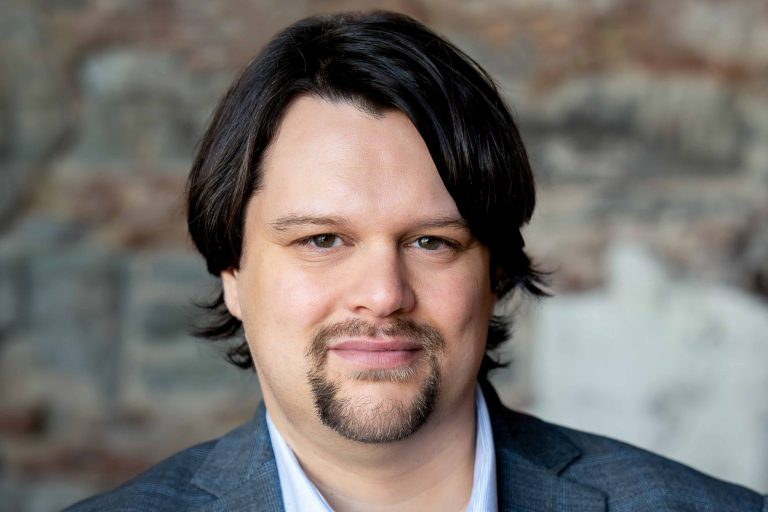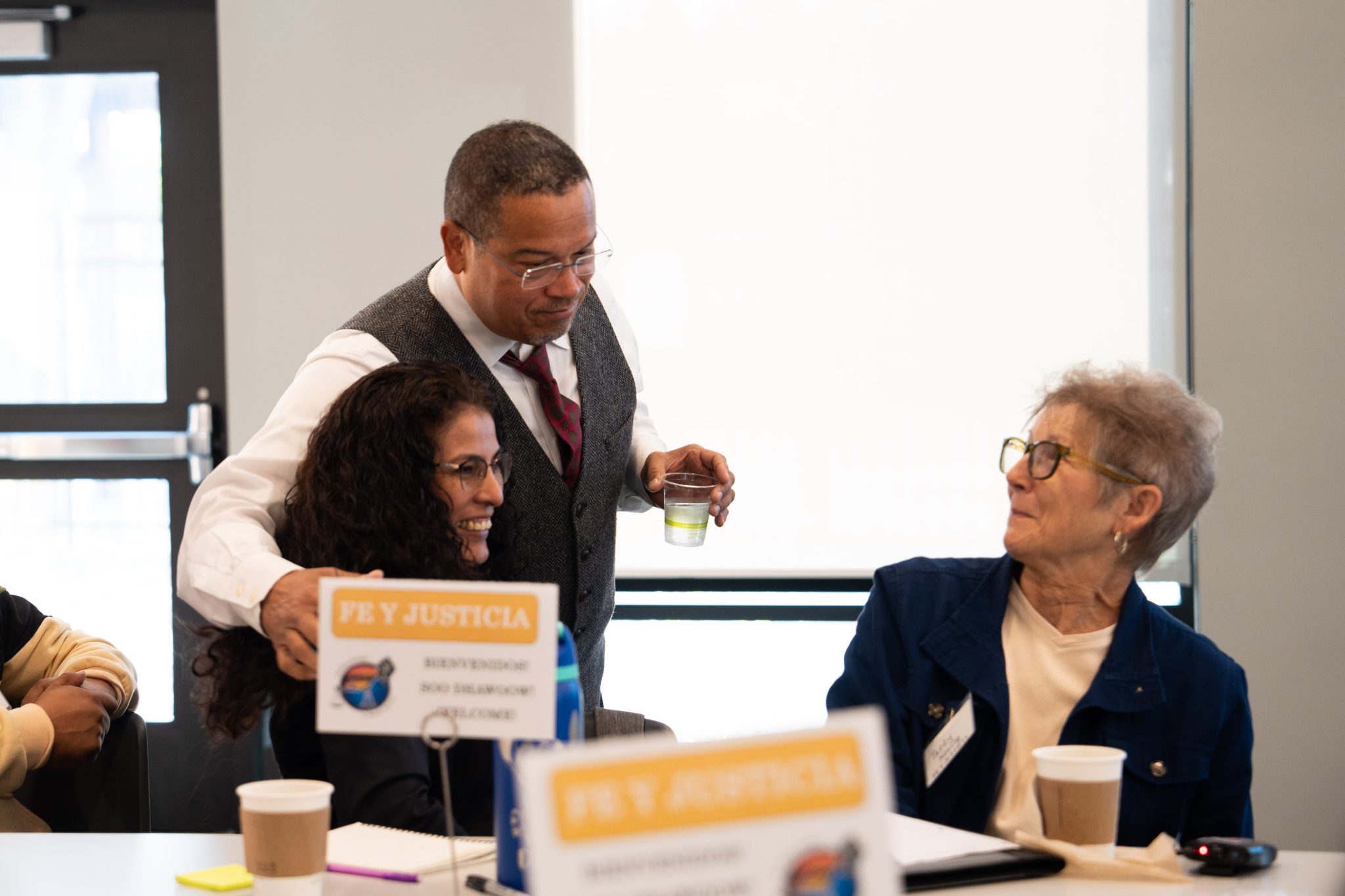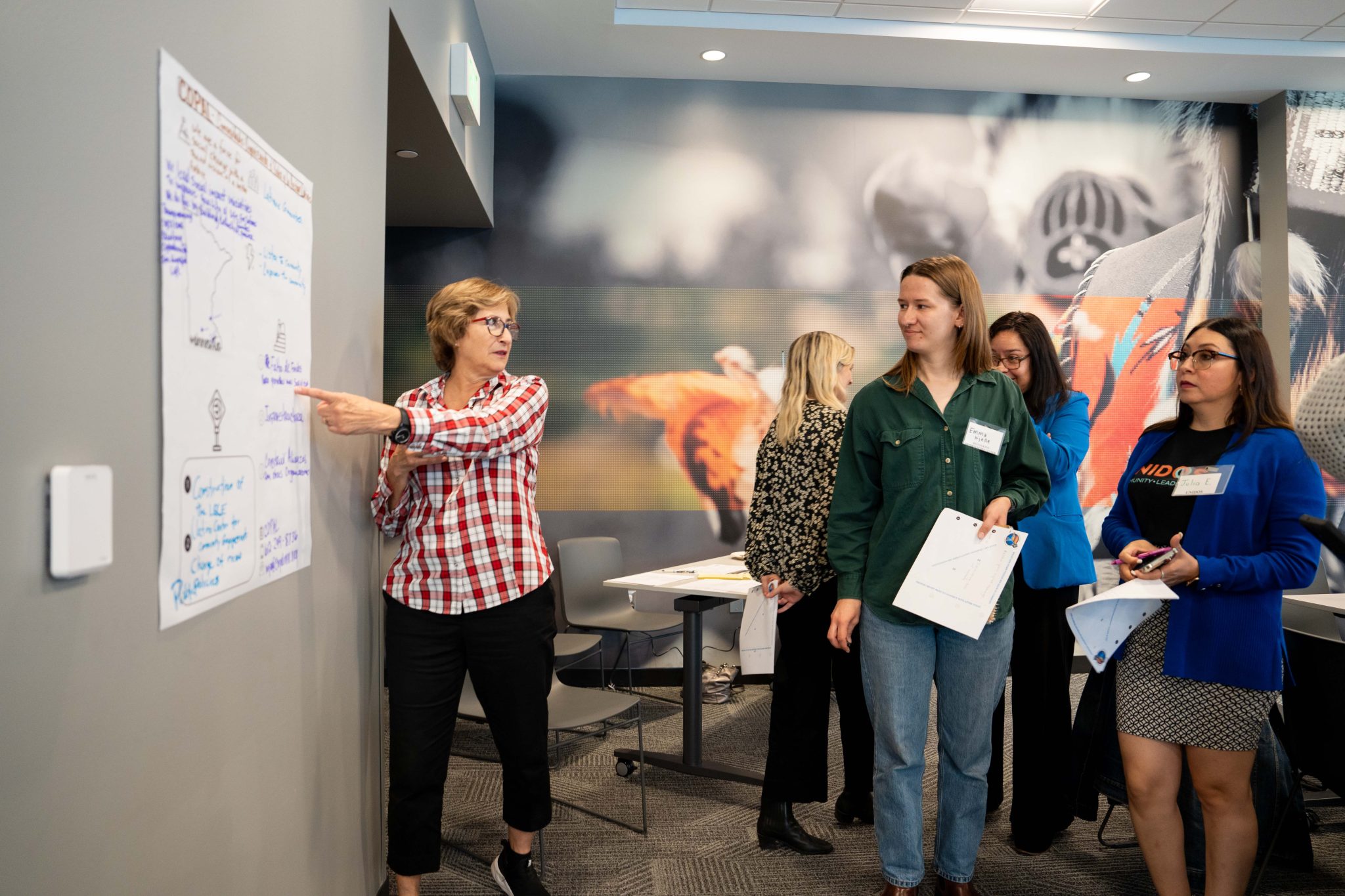
الفئة:قصة التأثير13 قراءة دقيقة
الفئة:قصة التأثير13 قراءة دقيقة
في مختلف أنحاء الولاية، يتجمع عمال مينيسوتا معًا لبناء القوة، والحصول على ظروف عمل أكثر عدالة، وتعزيز اقتصاد أكثر شمولاً ومرونة حيث تكون معنويات الموظفين عالية، ومعدلات دوران العمل منخفضة، ويمكن لكل عامل أن يعتمد على وظيفة آمنة وراتب يكفي لإعالة أسرته. عندما يتم التعامل مع العمال بشكل عادل، يمكنهم بناء الثروة والاستثمار في مجتمعاتهم - تحقيق تطلعاتهم، وإثراء نسيجنا الاجتماعي، وتعزيز الاقتصادات المحلية.
إن هؤلاء العمال يبنون قوتهم من خلال تعلم حقوقهم وتوسيع قدرتهم على النضال من أجلها. وينضم بعضهم إلى النقابات، ويكتسب آخرون زخمًا جماعيًا من خلال مراكز العمال إن العديد من هذه المجموعات، التي تتراوح من المنظمات غير الربحية الرسمية إلى التعاونيات الشعبية، تتعاون وتتعلم من بعضها البعض في الوقت الحقيقي، حتى في حين تستجيب للاحتياجات المحددة للمجتمعات التي تقودها وتخدمها.
منذ أكثر من 17 عامًا، تعمل المنظمة غير الربحية التي يقودها العمال مركز العمال المتحدين في لا لوتشا (CTUL) كانت تكافح من أجل حماية وتوسيع حقوق العمال غير النقابيين في منطقة توين سيتيز. في أكتوبر 2024، احتفلت CTUL بحدث مهم لصناعة البناء في مينيسوتا وخارجها من خلال الإعلان عن اثنان من المطورين غير الربحيين انضموا إليهم برنامج بناء الكرامة والاحترام (BDR).
الفيديو من إنتاج Line Break Media.
يهدف البرنامج إلى تعزيز نهج جديد لزيادة الحراك الاقتصادي والسلامة الوظيفية لعمال البناء في توين سيتيز، بهدف تعزيز "حقوق الإنسان للعمال الذين يبنون مجتمعاتنا". وينصب تركيزه الأساسي على إرساء معايير توظيف عادلة ومنصفة داخل صناعة البناء، التي واجهت التدقيق بسبب استغلال العمال وسرقة الأجور وظروف العمل غير الآمنة. وقال ميرل باين، المدير المشارك لـ CTUL: "هذه الأفعال الظالمة هي ما يختبئ في ظلال اقتصادنا، ويختبئ في ظلال المباني التي يتم بناؤها، ويختبئ داخل الغرف الخلفية ومطابخ المطاعم التي نتناول فيها الطعام".
يلتزم المطورون الذين يوقعون على BDR بتوفير وقت مدفوع الأجر للعمال حتى يتمكنوا من حضور ورش العمل التي تعرفهم على حقوقهم والتي تقدمها CTUL، وهناك خط ساخن يمكن للعمال الاتصال به إذا كانت لديهم مخاوف بشأن مكان العمل أو يريدون معرفة المزيد عن حقوقهم، بالإضافة إلى برنامج مراقبة مستقل لمراجعة سلسلة المقاولات من الباطن والبناء وضمان معاملة العمال بشكل عادل.
وقال باين، الذي أشار إلى أن البرنامج يمكّن العمال من حماية حقوقهم دون خوف من الانتقام، "لقد تم تحديد وكتابة مدونة قواعد السلوك من قبل العمال بشأن الحماية التي يحتاجون إليها في مكان العمل".
إن اتحاد العمال في مينيسوتا هو جزء من حركة العدالة العمالية المتنامية في مينيسوتا. إن الجهود المبذولة لحماية وتوسيع حقوق العمال تنمو خارج صناعة البناء. ففي مختلف القطاعات، يواجه سكان مينيسوتا المجتهدون ظروف عمل غير آمنة، وسرقة الأجور، والأجور الراكدة، والتمييز، وأكثر من ذلك. وتعمل النقابات والمنظمات غير الربحية التي يقودها المجتمع ومراكز العمال على خلق فرص بناء القوة للجميع الذين يعملون في ولايتنا. وهم يتأكدون من أن العمال يطورون المعرفة والمهارات التي يحتاجون إليها لتنظيم واستخدام قوتهم.
خذ على سبيل المثال، في و العدالة، وهي منظمة دينية مقرها في وسط مينيسوتا تخدم في المقام الأول المجتمعات اللاتينية مع التركيز على الصناعات الزراعية وتعليب اللحوم. وتسيطر العمالة المهاجرة على صناعة تعبئة اللحوم على وجه الخصوص: وفقًا للبيانات الصادرة عن مركز البحوث الاقتصادية والسياسية44.4% من عمال تعبئة اللحوم من أصل لاتيني و38% من قوة العمل في تعبئة اللحوم من المهاجرين. وبالمقارنة، يشكل المهاجرون 17% من قوة العمل في الولايات المتحدة.
في ولاية مينيسوتا، كان العمال في مصانع تعبئة اللحوم احتج على ظروف العمل غير الآمنة وقد أدت هذه الممارسات إلى إصابات وانتشار سريع لأمراض مثل كوفيد-19. كما يخشى هؤلاء العمال من الانتقام من شركات تعبئة اللحوم إذا تحدثوا.
تعمل منظمة Fe y Justicia على تدريب العمال ليصبحوا قادة يناضلون من أجل العدالة، ويعملون بالشراكة مع منظمات أخرى للوصول إلى مجتمعات أخرى من العمال في منطقتهم.
وقالت السيدة إيلينا جوتيريز، المديرة التنفيذية لمنظمة "في إي جوستيسيا": "نحن نعمل على دعم العمال حتى يتمكنوا من الدفاع عن أنفسهم ورفع أصواتهم حتى يمكن إحداث التغيير".
ويشارك جوتيريز أيضًا أن Fe y Justicia هي منظمة تعاونية، لذا فهم يتعاونون مع منظمات أخرى تصل إلى العمال عبر الصناعات الأخرى وتبني معهم.
"نحن نلتقي باللاتينيين، ونعمل مع المنظمات التي تعمل مع الصوماليين والبيض حتى يلتقوا ببعضهم البعض ويدركوا أن نضالهم واحد. إنهم جميعًا يعملون بجد ولكنهم لا يحصلون جميعًا على ما يكفي من المال لسداد فواتيرهم"، كما قال جوتيريز. "قد يشعرون أحيانًا أنهم مضطرون إلى معارضة المجموعات الأخرى، ولكن عندما يجتمعون معًا، يكتشفون أن نضالهم واحد. ولهذا السبب نعمل مع المنظمات الأخرى، لأن ذلك يجمع المجموعات معًا وهذا يبني القوة".

إن هذا الشعور بالتعاون والشراكة كأداة لبناء القوة هو خط متواصل عبر حركة العدالة للعمال في مينيسوتا - وهو آخذ في النمو.
قالت شيلي شتاين، المنظمة الرئيسية لـ مركز فرص المطاعم مينيسوتا (ROC-MN). "كما تحدثت إلى أشخاص في جميع أنحاء البلاد، فإن أحد الأشياء التي غالبًا ما يتم تسليط الضوء عليها حول قوة النظام البيئي في مينيسوتا هو أن كل منظمة لديها علاقات شخصية وتنظيمية مع بعضها البعض، لذلك يمكننا في الواقع التحرك معًا بسرعة كبيرة."
يتألف هذا النظام البيئي من منظمات وشراكات وشركاء متعددين. وتشمل المنظمات الشريكة هيئات حكومية مثل مكتب النائب العام وممولين مثل مؤسسة ماكنيت التي ترى دورها كجسر بين العمال وصناع السياسات وصناع القرار الذين قد لا يتمكنون من الوصول إليهم لولا ذلك.
على مدى السنوات العديدة الماضية، جمهورية الصين-مينيسوتا تعمل شركة "إنتركونتيننتال إكستشينج" على بناء مجتمع في مكان العمل، من خلال جمع العمال معًا للاستفادة من قوتهم الجماعية وإحداث تغيير إيجابي في أماكن عملهم ووضع معايير توظيف أعلى لصناعة المطاعم وخارجها.
"وفي المطاعم وخدمات الطعام على وجه الخصوص، لدينا انقسامات عرقية وانقسامات جنسية وانقسامات هوية أخرى يتم رسمها في الواقع على أسس مهنية"، كما قال شتاين. "إن جزءًا كبيرًا من العمل يتلخص في مساعدة العمال على تحديد كيفية بناء الجسور معًا وكيفية تحديد القضايا الموحدة حتى يتمكنوا من النضال معًا".
وأضاف شتاين أن الانقسامات الأكبر ليست بين العمال، بل بين أصحاب العمل والموظفين، لأن أصحاب العمل قد يكونون منفصلين تمامًا عن التجربة المعيشية للعمال.
"خلال السنوات الأربع الماضية، خضنا بعض المعارك الكبرى ضد سرقة الأجور، فضلاً عن بعض الأمور الأصغر على طول الطريق، لدعم العمال الأفراد الذين يواجهون أصحاب عملهم"، كما قال شتاين. "لقد دعمنا أيضًا العمال الذين يناضلون ليس فقط من أجل حقوقهم بموجب القانون، ولكن أيضًا ما نسميه المطالبات غير القانونية، وهي أشياء نعتقد أن العمال يستحقونها ولكن القانون لا يحميها".
وتشمل هذه المطالب غير القانونية التأمين الصحي، وممارسات الجدولة العادلة، وحملة نقابية لدعم العمال في مختلف المطاعم والمقاهي وأماكن الموسيقى. وقال شتاين: "هذا مثير بالنسبة لنا لأن العديد من العمال جاءوا من خلال برامجنا لتطوير القيادة".
يعد تطوير القيادة جوهر تنظيم المجتمع، وكذلك رسم خريطة القوة وتوفير التعليم المجتمعي الذي يركز على الناس-يتم الاستفادة من جميع الممارسات في جميع أنحاء حركة العمل في ولاية مينيسوتا. مثل CTUL، تقدم العديد من المنظمات اعرف حقوقك دورات تدريبية يتعلم فيها العمال كيفية الدفاع عن أنفسهم في مكان عملهم للتنظيم ضد سرقة الأجور، والعنف القائم على النوع الاجتماعي، وغير ذلك من أشكال سوء المعاملة من قبل أصحاب العمل.
"نحن لا نساعد الناس على الحصول على وظائف فحسب، بل نزودهم أيضًا بمعلومات حول حقوقهم. نجتمع كل يوم أحد، لأن هذا هو الوقت الذي يتوفر فيه العمال"، قالت كلوديا لانيز، مديرة مركز "العمالة في المناطق الريفية". مركز عمال كوبال"نحضر أشخاصًا مختلفين للتحدث عن القانون وحقوقهم، وفي حالة سرقة الأجور، وهو أمر شائع جدًا، نعمل معهم لمحاولة إيجاد طرق لجمع تلك الأجور. سنكتب خطابًا، وسنتواصل مع صاحب العمل، وسنقوم بإصلاحه." النائب العامسوف نتواصل مع وزارة العمل والصناعة"ولقد نجحنا في استعادة بعض تلك الأجور."
افتتح مركز العمال التابع لـ COPAL منذ ثلاث سنوات، وهو يوفر مجموعة واسعة من الخدمات للعمال: التوظيف والمهنة للبالغين والشباب (16-24)، وتعليم ودعم معرفة حقوقك، ودروس الكمبيوتر، وتوجيه اختبار ممارسة رخصة القيادة، وعيادات اللقاح، والاتصالات بموارد أخرى. للمنظمة غير الربحية مواقع في مينيابوليس ومانكاتو وروتشستر.
وتعتقد لينيز أن المنظمات مثل COPAL - والتي تعني Comunidades Organizando El Poder Y La Acción Latina (المجتمعات المنظمة من أجل القوة والعمل اللاتيني) - سوف تُدعى إلى القيام بمزيد من التثقيف المجتمعي في المستقبل، بسبب الانتخابات الأخيرة.
"لدينا الكثير من الناس الذين يخشون ما قد يحدث. وسيتعين علينا القيام بالكثير من التثقيف والتنظيم، لأننا نريد أن يعرف الجميع حقوقهم وأن نضمن استعدادهم في حالة حدوث أي شيء"، كما قال لينيز.

من أجل توفير الموارد لحركة العدالة للعمال في ولاية مينيسوتا، تدرس منظمات مثل ماكنيت بعمق كيفية دعم حركة يقودها العمال من أجل العدالة، وتسعى جاهدة إلى تركيز المجتمعات الأكثر تأثرًا في استراتيجياتها للتغيير.
قالت سارة هيرنانديز، مسؤولة البرامج الرئيسية في مؤسسة ماكنيت، والتي تقود محفظة "تسريع التنقل الاقتصادي" ضمن برنامج المجتمعات النابضة بالحياة والمنصفة: "ما نعنيه بتسريع التنقل الاقتصادي هو تعزيز الوظائف الجيدة من خلال عدسة عدالة العمال". "نحن نركز على أجور كافية لإعالة الأسرة"ماذا يعني نقل الناس إلى وظائف ذات جودة ونقل الأفراد من ذوي الدخل المنخفض أو عديمي الدخل إلى وظائف تدفع أجورًا كافية لإعالة أسرهم؟ هذا هو نجمنا الشمالي من حيث القياس."
"عندما تركز الأصوات، ويتم تمكين العمال، فإن ذلك يخلق فرصًا للناس للمساهمة في مجتمعاتهم، والمشاركة في الاقتصادات المحلية، وإنشاء أماكن نابضة بالحياة وبنية أساسية آمنة للجميع. الأمر لا يتعلق فقط بالتأثير على العمال، بل هناك تأثير متموج"، كما قال هيرنانديز.
وفقًا لباين، هناك شركات تريد القيام بالشيء الصحيح وهي تبحث فقط عن فرصة. ويقول إن خلق مساحات حيث يمكن للشركات مثل شركات البناء أن تتقدم سوف يدعو هذه الشركات إلى طاولة المفاوضات - وهذا أمر جيد للعمال وأصحاب العمل.
تتخيل جوتيريز في منظمة Fe y Justicia يومًا حيث يحصل كل عامل في مينيسوتا على وظيفة جيدة تمكنه من تحقيق أعلى تطلعاته. وتقول إنه عندما تكون الوظائف آمنة وتدفع أجورًا عادلة، "يمكن للناس أن يفعلوا أكثر من مجرد العمل في مزرعة ألبان. يمكنهم الترشح لمنصب. يمكنهم بذل المزيد من الجهد لإحداث التغيير الذي يسعون إليه".